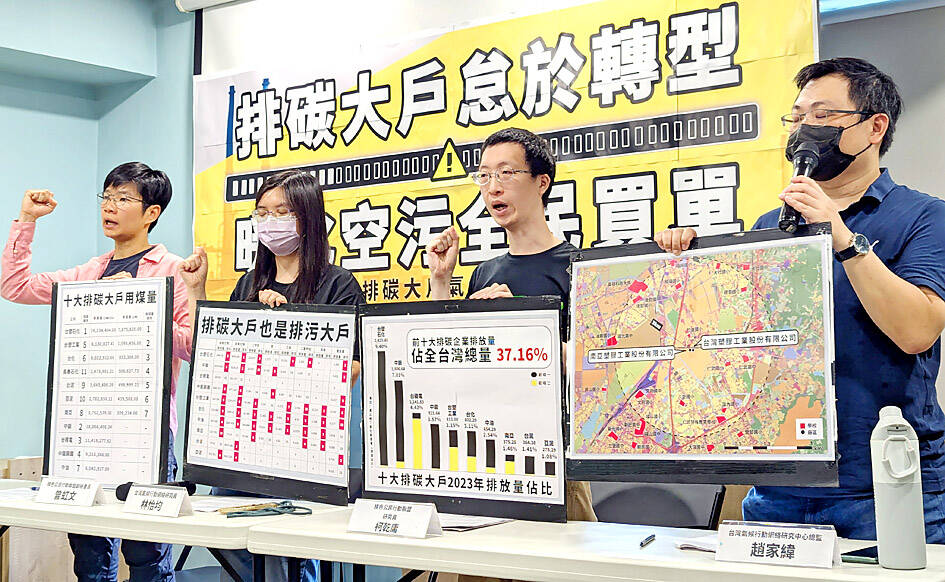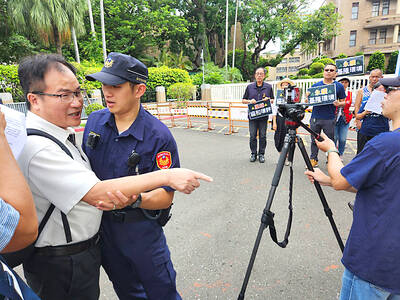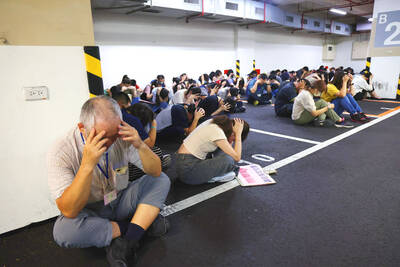Environmental advocacy groups yesterday called on the government to draft and implement carbon reduction policies that focus on the petrochemical and semiconductor manufacturing industries.
The groups urged manufacturers to be more proactive in setting mid-term carbon reduction goals and to step up their plans to use renewable energy.
They also urged the Financial Supervisory Commission (FSC) to be more transparent about corporations’ compliance with environmental, social and governance concepts, and to provide data on how well companies are implementing such policies.

Photo: CNA
The government should set a deadline for the manufacturing sector to become coal-free, they said.
Of the 1,829 listed companies in Taiwan, only 181, or about 10 percent, have committed to achieving net zero emissions, while only 8.8 percent have set carbon reduction goals for 2030-2035, Green Citizens’ Alliance researcher Ko Chien-yung (柯乾庸) said.
More than 90 percent of listed companies have not put out any sort of pledge, underscoring a lack of corporate initiative, he added.
Ko cited a joint survey on major producers of carbon emissions and listed companies’ carbon reduction efficiency by the Action Alliance and the Taiwan Climate Action Network (TCAN), which shows that the top 10 companies in the manufacturing industry comprise 37.16 percent of the industry’s total emissions of 48.44 percent.
Formosa Plastics Group (FPG) contributes 9.4 percent to the nation’s carbon emissions, while Taiwan Semiconductor Manufacturing Co’s carbon emissions have also grown considerably as it expands capacity, Ko said.
Of the 42 petrochemical companies and 33 semiconductor companies listed in the report, 22 petrochemical companies’ stated carbon reduction goals are lower than the national goal of 24 percent, TCAN researcher Lin Yi-chun (林怡均) said.
More than 60 percent of companies’ carbon reduction goals only meet the government’s bare minimum of 1 percent, and they also do not use renewable energy, she said, urging the industry to make policy adjustments and for the government to regulate energy and water usage, as well as carbon emissions, for semiconductor producers.
FPG used 10.13 million tonnes of coal in 2023, very close to the amount used by the coal-fired Taichung Power Plant’s annual consumption of 12 million tonnes, TCAN deputy secretary-general Tseng Hung-wen (曾虹文) said.
Carbon fees are too low and rates should be reviewed more frequently, TCAN director Chao Chia-wei (趙家緯) said.
Reviews are currently held bienially, Chao added.
The lax carbon policies and incentives for setting autonomous carbon reduction plans are counterintuitive for greenhouse gas-emitting companies to upgrade their production methods to reduce carbon emissions, he said.

Environmental groups yesterday filed an appeal with the Executive Yuan, seeking to revoke the environmental impact assessment (EIA) conditionally approved in February for the Hsieh-ho Power Plant’s planned fourth liquefied natural gas (LNG) receiving station off the coast of Keelung. The appeal was filed jointly by the Protect Waimushan Seashore Action Group, the Wild at Heart Legal Defense Association and the Keelung City Taiwan Head Cultural Association, which together held a news conference outside the Executive Yuan in Taipei. Explaining the reasons for the appeal, Wang Hsing-chih (王醒之) of the Protect Waimushan Seashore Action Group said that the EIA failed to address

Taipei on Thursday held urban resilience air raid drills, with residents in one of the exercises’ three “key verification zones” reporting little to no difference compared with previous years, despite government pledges of stricter enforcement. Formerly known as the Wanan exercise, the air raid drills, which concluded yesterday, are now part of the “Urban Resilience Exercise,” which also incorporates the Minan disaster prevention and rescue exercise. In Taipei, the designated key verification zones — where the government said more stringent measures would be enforced — were Songshan (松山), Zhongshan (中山) and Zhongzheng (中正) districts. Air raid sirens sounded at 1:30pm, signaling the

The number of people who reported a same-sex spouse on their income tax increased 1.5-fold from 2020 to 2023, while the overall proportion of taxpayers reporting a spouse decreased by 4.4 percent from 2014 to 2023, Ministry of Finance data showed yesterday. The number of people reporting a spouse on their income tax trended upward from 2014 to 2019, the Department of Statistics said. However, the number decreased in 2020 and 2021, likely due to a drop in marriages during the COVID-19 pandemic and the income of some households falling below the taxable threshold, it said. The number of spousal tax filings rebounded

A saleswoman, surnamed Chen (陳), earlier this month was handed an 18-month prison term for embezzling more than 2,000 pairs of shoes while working at a department store in Tainan. The Tainan District Court convicted Chen of embezzlement in a ruling on July 7, sentencing her to prison for illegally profiting NT$7.32 million (US$248,929) at the expense of her employer. Chen was also given the opportunity to reach a financial settlement, but she declined. Chen was responsible for the sales counter of Nike shoes at Tainan’s Shinkong Mitsukoshi Zhongshan branch, where she had been employed since October 2019. She had previously worked